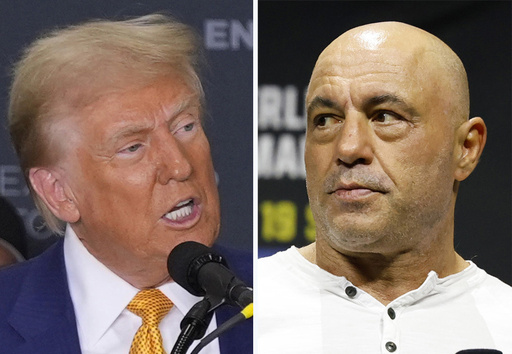In a recent lengthy conversation with podcaster Joe Rogan, Donald Trump reiterated his unfounded assertions regarding the 2020 presidential election, claiming it was marred by fraud and that he actually won. Throughout the three-hour discussion, Rogan appeared to endorse some of these controversial statements.
The interview, made public on a Friday, coincided with Trump sharing actionable threats on his social media platform, targeting lawyers, voters, and election officials he accuses of dishonesty in the upcoming 2024 election.
To clarify some of the claims raised by Trump, it’s essential to understand the facts behind them.
To begin with, Trump maintains he did not lose the 2020 election, stating, “I won by like — they say I lost by like — I didn’t lose.” However, the truth is quite clear: Trump lost to Joe Biden in the 2020 election. Multiple inquiries into alleged fraud have consistently debunked Trump’s assertions. His former attorney general confirmed there was no significant fraud detected. Moreover, investigations conducted by Michigan’s Republican-led state Senate and Wisconsin’s nonpartisan Legislative Audit Bureau both concluded that there was no substantial evidence supporting claims of fraud in those crucial states.
Although Trump accurately noted that the election outcomes were close, he misrepresented the details. He lost by narrow margins in six battleground states. Had the votes shifted marginally — about 81,000 — he might have secured victories in states like Arizona, Georgia, Nevada, and Wisconsin, establishing enough Electoral College support to retain his position. Nevertheless, Trump inaccurately cited that margin as being just 22,000 votes.
When it comes to the legal challenges he mounted after the election, Trump argued, “What happened is judges don’t want to touch it. They would say, ‘you don’t have standing.’ They didn’t rule on the merits.” This claim is misleading, as Trump and his supporters faced over 50 legal losses aimed at contesting the election results. A complete review of 64 lawsuits showed that only 20 were dismissed without a hearing on the merits; in fact, 30 of those rulings were made after judges reviewed the evidence. In 14 instances, Trump withdrew his lawsuits before they could be fully examined, with reports indicating that his legal representatives often arrived in court without substantial evidence to back their claims.
Trump further advocated for a complete shift to paper ballots, asserting, “We should go to paper ballots.” However, this is somewhat misguided because the majority of U.S. election jurisdictions already use paper ballots. In fact, more than 90% utilized paper ballots during the 2020 elections, as documented by the Brennan Center for Justice. Following this, changes in the guidelines from the federal Election Assistance Commission have encouraged jurisdictions to employ paper voting systems. The only state that currently does not utilize a paper ballot system is Louisiana, which is governed by Republicans.
Moreover, Trump alleged, “They used COVID to cheat,” insinuating that a Democratic conspiracy manipulated voting regulations during the pandemic to favor mail-in voting. Contrary to this claim, both Republican and Democratic election officials encouraged mail voting as a means to mitigate overcrowded polling stations during the height of the pandemic. Trump’s opposition to mail voting emerged later, suggesting the potential for fraud — a familiar narrative he resorts to whenever faced with election loss. His claims about the 2016 election were similar, alleging illegal immigrant voting influenced the popular vote against him, even though a commission he established to investigate this matter ultimately found no evidence to support his claim.
When assessing the integrity of the 2020 election, it’s important to acknowledge that while instances of voter fraud can occur sporadically, they have not reached levels that could alter the national outcome. A review, which included six battleground states, unearthed fewer than 475 isolated cases where votes were potentially fraudulent, a trivial number considering Trump lost those states by over 300,000 votes combined. This underlines that the election was largely free from significant fraud, reiterating the legitimacy of the results.



